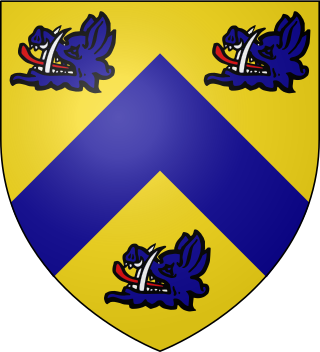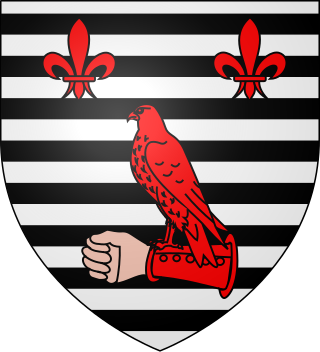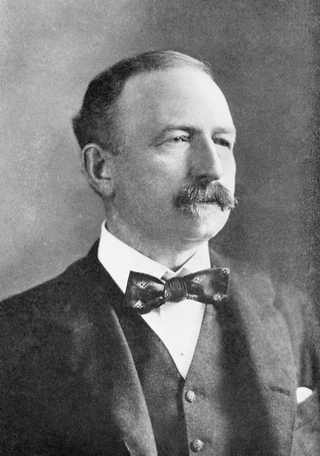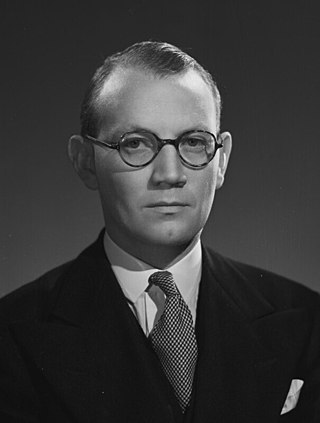Arms
 |
|
Baron Aldington, of Bispham in the County Borough of Blackpool, is a title in the Peerage of the United Kingdom. It was created on 29 January 1962 for the Conservative politician and businessman, Sir Toby Low. On 16 November 1999 he was made a life peer as Baron Low, of Bispham in the County of Lancashire, as were all hereditary peers of the first creation following the House of Lords Act 1999.[ citation needed ] On his death in 2000 the life peerage became extinct while he was succeeded in the hereditary barony by his son Charles, the second and (As of 2021 [update] ) present holder of the title.[ citation needed ]
Lord Aldington was controversially accused of sending 70,000 cossacks and their families who had surrendered to the British forces in Austria after the Second World War over the border to the Soviets. This highly secret act contravened the Geneva Convention as they were not citizens of the USSR, and it was obvious that they would be massacred or sent to GULAGs. The historian Nikolai Tolstoy said as much in print and was sued by Aldington in 1989 for defamation. In a highly controversial court case, Aldington won and Tolstoy was asked to pay £1.5m in damages and £0.5m for Aldington's legal fees. [1]
The heir apparent and sole heir to the peerage is the present holder's son, Philip Toby Augustus Low (b. 1990) [2]
 |
|

Marquess of Cholmondeley is a title in the Peerage of the United Kingdom. It was created in 1815 for George Cholmondeley, 4th Earl of Cholmondeley.

Lord Rollo, of Duncrub in the County of Perth, is a title in the Peerage of Scotland. It was created on 10 January 1651 for Sir Andrew Rollo, with remainder to his heirs male whatsoever. His great-great-grandson, the fifth Lord, was a Brigadier-General in the Army and fought in North America during the Seven Years' War. He died without surviving male issue and was succeeded by his younger brother, the sixth Lord. His grandson, the eighth Lord, sat in the House of Lords as a Scottish representative peer from 1841 to 1846. His son, the ninth Lord, was a Scottish Representative Peer from 1847 to 1852. His son, the tenth Lord, sat in the House of Lords as a Scottish Representative Peer from 1860 to 1868. On 29 June 1869 he was created Baron Dunning, of Dunning and Pitcairns in the County of Perth, in the Peerage of the United Kingdom, with remainder to the heirs male of his body. This title gave the Lords an automatic seat in the House of Lords until 1999. As of 2017 the titles are held by the tenth Lord's great-great-grandson, the fourteenth Lord, who succeeded his father in 1997. He is the hereditary Clan Chief of Clan Rollo.

Viscount Trenchard, of Wolfeton in the County of Dorset, is a title in the Peerage of the United Kingdom. It was created in 1936 for Marshal of the Royal Air Force, Hugh Trenchard, 1st Baron Trenchard. He had already been created a Baronet, of Wolfeton in the County of Dorset, in the Baronetage of the United Kingdom in 1919 and Baron Trenchard, of Wolfeton in the County of Dorset, in 1930, also in the Peerage of the United Kingdom. His second son, the second Viscount, held junior ministerial positions from 1979 to 1983 in the Conservative administration of Margaret Thatcher. As of 2018 the titles are held by the latter's son, the third Viscount, who succeeded in 1987. In 2004 he replaced the recently deceased Lord Vivian as one of the ninety elected hereditary peers that are allowed to remain in the House of Lords after the passing of the House of Lords Act 1999. Lord Trenchard sits on the Conservative benches.

Baron Freyberg, of Wellington in New Zealand and of Munstead in the County of Surrey, is a title in the Peerage of the United Kingdom. It was created in 1951 for the prominent military commander Lieutenant-General Sir Bernard Freyberg. He served as Governor-General of New Zealand from 1946 to 1952. His only son, the second Baron, was a Colonel in the Grenadier Guards.

Baron Glentoran, of Ballyalloly in the County of Down, is a title in the Peerage of the United Kingdom. It was created on 8 July 1939 for the Unionist politician Herbert Dixon. In 1950 he also succeeded his elder brother as third Baronet, of Ballymenock. His son, the second Baron, was also a politician and served as the last Speaker of the Senate of Northern Ireland. As of 2017 the titles are held by the latter's son, the third Baron, who succeeded in 1995. He is a former Olympic bobsleigh gold medallist as well as a soldier, businessman and politician. Lord Glentoran was one of the ninety elected hereditary peers who remain in the House of Lords after the passing of the House of Lords Act 1999, and sat on the Conservative benches until his June 2018 retirement under the House of Lords Reform Act 2014.
Baron Addington, of Addington in the County of Buckingham, is a title in the Peerage of the United Kingdom. It was created on 22 July 1887 for the businessman and Conservative Member of Parliament, John Hubbard. He was head of the firm of John Hubbard & Co and also sat as a Member of Parliament for Buckingham and the City of London. His eldest son, the second Baron, was a partner in the family firm and represented Buckingham in the House of Commons as a Conservative. He was succeeded by his eldest son, the third Baron. He was three times Mayor of Buckingham. On the death of his younger brother, the fourth Baron, the line of the eldest son of the first Baron failed. The title passed to their first cousin once removed, the fifth Baron. He was the grandson of Cecil John Hubbard, third son of the first Baron. As of 2018, the title is held by his eldest son, the sixth Baron. He is one of the ninety elected hereditary peers that remain in the House of Lords after the passing of the House of Lords Act of 1999. Lord Addington sits on the Liberal Democrat benches.

Baron Astor of Hever, of Hever Castle in the County of Kent, is a title in the Peerage of the United Kingdom. It was created in 1956 for John Jacob Astor, a prominent newspaper proprietor and Conservative politician. He was the fourth child of William Waldorf Astor, 1st Viscount Astor. Lord Astor of Hever was succeeded in 1971 by his eldest son, the second Baron, who served as Lord Lieutenant of Kent between 1972 and 1982.

Baron Shaughnessy, of the City of Montreal in the Dominion of Canada and of Ashford in the County of Limerick, is a title in the Peerage of the United Kingdom. It was created in 1916 for the Milwaukee born businessman Thomas Shaughnessy, president of the Canadian Pacific Railway Company. He was succeeded by his eldest son, the second Baron, a Director of the CPR and of the Canadian Bank of Commerce. His son, the third Baron, was a businessman and was also active in the House of Lords. However, he lost his hereditary seat in parliament after the House of Lords Act 1999.
Baron Shepherd, of Spalding in the County of Lincoln, is a title in the Peerage of the United Kingdom. It was created in 1946 for George Shepherd, who had previously served as National Agent of the Labour Party. His only son, Malcolm Newton Shepherd, 2nd Baron Shepherd the second Baron, was also a prominent Labour politician and notably served as Leader of the House of Lords. After the House of Lords Act 1999 removed the automatic right of hereditary peers to sit in the House of Lords he was given a life peerage as Baron Shepherd of Spalding, of Spalding in the County of Lincolnshire. This enabled him to remain an active member of the House of Lords On his death in 2001 the life barony became extinct, while he was succeeded in the hereditary barony by his eldest son, Graeme, the third and present holder of the title.
Baron Silkin, of Dulwich in the County of London, is a title in the Peerage of the United Kingdom. It was created on 4 July 1950 for the solicitor and Labour politician Lewis Silkin. The peerage was disclaimed by both his eldest son, the second Baron, and the latter's nephew, the third Baron. When the third Baron disclaimed the title in 2002, the barony of Silkin became the first peerage ever to be disclaimed twice; and the only disclaimer since the House of Lords Act 1999
Baron Milner of Leeds, of Roundhay in the City of Leeds, is a title in the Peerage of the United Kingdom. It was created on 20 December 1951 for the Labour politician James Milner. His only son, the second Baron, was one of the ninety elected hereditary peers that were allowed to remain in the House of Lords after the House of Lords Act of 1999. Like his father Lord Milner of Leeds sat on the Labour benches. As of 2018 the title is held by the latter's only son, the third Baron, who succeeded in 2003.
Baron Bridges, of Headley in the County of Surrey and of Saint Nicholas at Wade in the County of Kent, is a title in the Peerage of the United Kingdom. It was created on 4 February 1957 for the prominent civil servant Sir Edward Bridges. He was Cabinet Secretary from 1938 to 1946. He was succeeded by his son, the second Baron, in 1969. He notably served as British Ambassador to Italy from 1983 to 1987. Lord Bridges was one of the ninety-two elected hereditary peers that remained in the House of Lords after the passing of the House of Lords Act 1999, before his removal for non-attendance in 2016. As of 2017 the title is held by his son, the third Baron, who succeeded to the title in that year. He was the solicitor to, among others, Queen Elizabeth II and other members of the royal family.

Baron Trevethin, of Blaengawney in the County of Monmouth, is a title in the Peerage of the United Kingdom. It was created in 1921 for the prominent judge Sir Alfred Lawrence, Lord Chief Justice of England from 1921 to 1922.
Baron Crathorne, of Crathorne in the North Riding of the County of York, is a title in the Peerage of the United Kingdom. It was created on 15 July 1959 for the Conservative politician and former Minister of Agriculture and Fisheries, Sir Thomas Dugdale, 1st Baronet. He had already been created a baronet, of Crathorne in the North Riding of the County of York, in 1945. As of 2016 the titles are held by his son, the second Baron, who succeeded in 1977. Lord Crathorne is one of the ninety elected hereditary peers that remain in the House of Lords after the passing of the House of Lords Act 1999, and sits as a Conservative.
Baron Chorley, of Kendal in the County of Westmorland, is a title in the Peerage of the United Kingdom. It was created on 16 November 1945 for the barrister, academic and Labour politician, Robert Chorley. He was Sir Ernest Cassel Professor of Commercial and Industrial Law at the University of London from 1930 to 1946 and served as a Lord-in-waiting from 1946 to 1950 in the Labour administration of Clement Attlee. The second Baron, who succeeded his father in 1978, was one of the ninety elected hereditary peers elected remain in the House of Lords after the passing of the House of Lords Act of 1999, where he sat as a cross-bencher. As of 2016 the title is held by his son.

Baron Rea, of Eskdale in the County of Cumberland, is a title in the Peerage of the United Kingdom. It was created in 1937 for the businessman and Liberal politician Sir Walter Rea, 1st Baronet, who had earlier represented Scarborough, Bradford North and Dewsbury in the House of Commons. He had already been created a Baronet, of Eskdale in the County of Cumberland, in 1935. He was succeeded by his eldest son, the second Baron. During the Second World War he served as personal staff officer to Brigadier Colin Gubbins, the Head of SOE, a key British intelligence and guerrilla operations agency. Lord Rea served as Leader of the Liberal Party in the House of Lords from 1955 to 1967. His daughter, the Right Hon. Ann Felicity Rea, married SOE veteran Malcolm Munthe in 1945. His nephew, the third Baron, who succeeded in 1981, was a physician. He was one of the ninety elected hereditary peers elected to remain in the House of Lords after the passing of the House of Lords Act 1999, and sat on the Labour benches. As of 2020 the titles are held by his son, the fourth Baron, who succeeded his father in that year.
Baron Rotherwick, of Tylney in the County of Southampton, is a title in the Peerage of the United Kingdom.
Baron Greenway, of Stanbridge Earls in the County of Southampton, is a title in the Peerage of the United Kingdom. It was created in 1927 for Sir Charles Greenway, 1st Baronet, one of the founders of the Anglo-Persian Oil Company. He had already been created a Baronet, of Stanbridge Earls in the County of Southampton, in 1919. As of 2017 the titles are held by his great-grandson, the fourth Baron, who succeeded his father in 1975. Lord Greenway is one of the ninety elected hereditary peers that remain in the House of Lords after the passing of the House of Lords Act 1999, and sits as a cross-bencher.

Brigadier Toby Austin Richard William Low, 1st Baron Aldington, Baron Low,, known as Austin Richard William Low until he added "Toby" as a forename by deed poll on 10 July 1957, was a British Conservative Party politician and businessman. He was however best known for his role in Operation Keelhaul, the forced repatriation of Russian, Ukrainian and other prisoners of war, some of whom had collaborated with the Nazis, to the Soviet Union where many of them were executed or sent to labor camps. After he was accused of war crimes in the late 1980s, he successfully sued his accusers for libel.

Earl of Arran is a title in the Peerage of Ireland. It is not to be confused with the title Earl of Arran in the Peerage of Scotland. The two titles refer to different places: the Aran Islands in Ireland, and the Isle of Arran in Scotland. The Irish earldom is held by the Gore family. The Scottish earldom is a separate title, held as a subsidiary title of the Duke of Hamilton.